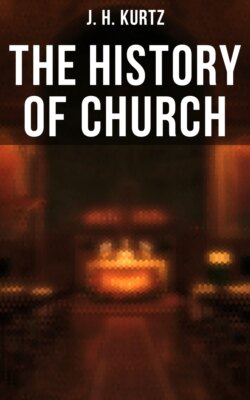Читать книгу The History of Church - J. H. Kurtz - Страница 63
На сайте Литреса книга снята с продажи.
ОглавлениеIV. DOCTRINAL CONTROVERSIES AND HERESIES.
Table of Contents
§ 49. The Development of Doctrine Generally.
When a considerable fulness of Christian doctrine had already in previous periods found subjective and therefore variously diversified development, it had now, besides being required by the altered condition of things, become necessary that the church should sift and confirm what was already developed or was still in the course of development. The endeavour after universal scientific comprehension and accurate definition became stronger every day. The lively intercourse between the churches, which prevented the various doctrinal types from being restricted to particular countries, brought opposite views into contact and conflict with one another. The court, the people, the monks took parts, and so the church became the scene of passionate and distracting struggles, which led to the issuing of a canon of orthodoxy recognised by the whole Catholic church of the West and of the East, and to the branding every deviation therefrom with the mark of heresy.
The Heresies of the previous period were mainly of a syncretic kind (§ 26). Those of the period now under consideration have an evolutionary or formatory character. They consist in the construction of the system of doctrine by exclusive attention and extreme estimation of the one side of the Christian truth that is being developed, which thus passes over into errors; while it is the task of orthodoxy to give proportionate development to both sides and to bring them into harmony. Of syncratic heresies only sporadic traces from the previous period are found in this (§ 54). The third possible form of heresies is the revolutionary or reformatory. Heretics of this class fancy that they see in the developed and fixed system of the Catholic church excrescences and degenerations which either do not exist, so that by their removal the church is injured and hindered in her essential and normal functions, or do really exist, but for the most part are not now duly distinguished from the results of sound and normal development, so that the good would be removed with the bad. During the period under consideration only isolated instances of this kind of heresy are met with (§ 62).
